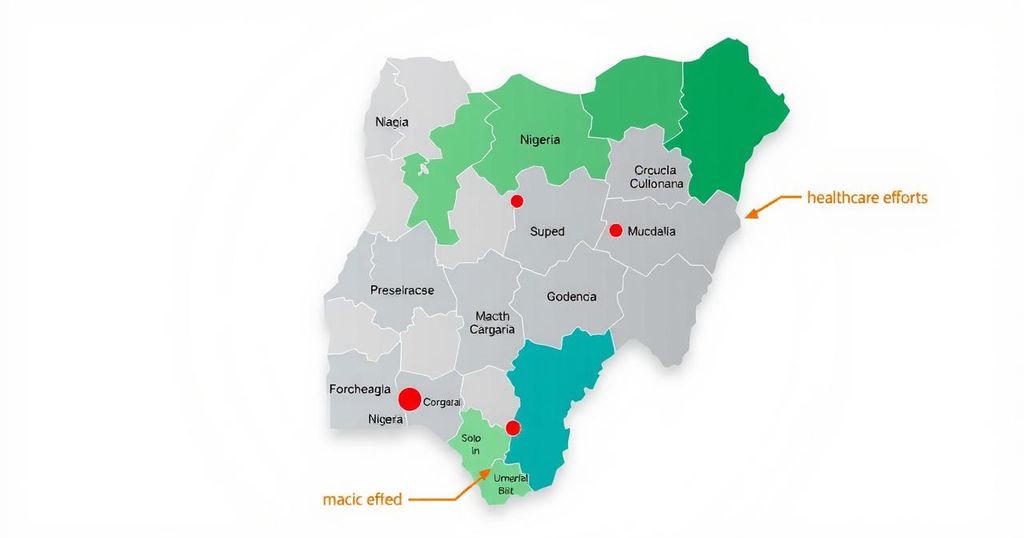Nigeria’s NCDC reports 1,319 deaths in the diphtheria outbreak with over 42,000 suspected cases since 2022. Major challenges include low vaccination rates and limited laboratory testing capacity. Kano State accounts for 75% of confirmed cases, and fatality rates are high in some areas. The government is initiating vaccination campaigns and strengthening community engagement to combat the crisis.
The Nigeria Centre for Disease Control and Prevention (NCDC) has reported 1,319 deaths resulting from the ongoing diphtheria outbreak in the nation. This alarming statistic was shared via the latest situation report from the National Diphtheria Emergency Operations Centre (EOC) published on Sunday. Diphtheria, caused by the bacterium Corynebacterium diphtheriae, primarily affects the throat and nose, producing a toxin that can lead to severe complications.
Vaccination serves as the foremost method of prevention, while early intervention with antitoxins and antibiotics is essential for disease management. The NCDC has indicated that over 42,000 suspected cases have been reported across 37 states since 2022. Their report, covering Epidemiological Week 10 of 2025, noted substantial challenges in combating the outbreak—such as low vaccination rates, insufficient laboratory capabilities, and delayed case confirmations.
Kano State is reported to harbor 75% of confirmed cases, amounting to 18,108 out of 25,812. Significant case figures are also noted in Bauchi (2,334), Yobe (2,408), and Katsina (1,501). The case fatality rate currently stands at 5.1%, translating to one death for every 20 confirmed cases, with some states, such as Kaduna and Lagos, experiencing even higher rates.
In the latest reporting week, the NCDC noted 23 new suspected cases—20 in Lagos and three in Katsina—though none were confirmed. Furthermore, 56.5% of cases remain unclassified due to laboratory confirmation delays. To combat these issues, the Federal Government has initiated reactive vaccination campaigns in heavily impacted areas and has sought to engage community leaders.
Public health experts have highlighted the detrimental impacts of delayed diagnosis and limited access to treatment, which may exacerbate fatality rates. Despite Nigeria’s Expanded Programme on Immunisation (EPI), only 19.3% of confirmed cases were fully vaccinated. Dr. Solomon Chollom, a medical virologist, pointed out critical gaps in routine immunisation, especially in northern Nigeria, advocating for urgent mass vaccination efforts targeting children aged one to fourteen.
In 2024, diagnoses were made predominantly based on symptoms due to a lack of laboratory testing, raising concerns about the accurate assessment of the outbreak’s scope. Although the government has committed to enhancing laboratory capabilities, progress has been slow. Experts recommend a nationwide vaccination initiative, improved disease surveillance, and a reliable supply of diagnostic materials to confront one of the worst diphtheria outbreaks in decades.
To mitigate this public health crisis, the government proposes increasing case management support and data coordination across affected states, enhancing laboratory accuracy through improved PCR testing, expanding vaccination coverage, and launching extensive public awareness campaigns. Experts continuously emphasize that preventive vaccination remains crucial, urging parents to ensure their children receive routine immunisations.
The ongoing diphtheria outbreak in Nigeria highlights serious public health challenges, evidenced by over 1,300 deaths and significant vaccination gaps. With Kano State representing a major portion of confirmed cases and the fatality rate alarmingly high in certain regions, experts advocate for urgent vaccination efforts and improved diagnostic capabilities. The Nigerian government has outlined comprehensive strategies to address these issues, yet implementation must be accelerated to prevent further deterioration of the situation.
Original Source: www.pulse.ng






